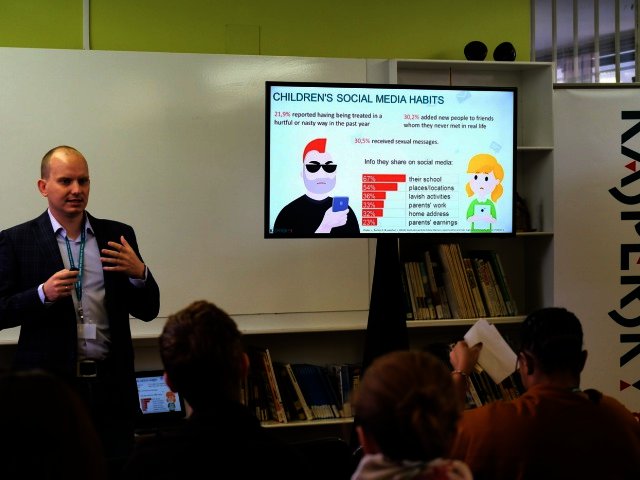Kaspersky Lab, in partnership with Active Education, have embarked on a series of interactive cybersecurity roadshows at selected schools in Johannesburg and Cape Town – aimed at driving top of mind awareness around online safety. The activations, aimed at children aged 7-13, covered key issues that children are vulnerable to when online. This includes cyberbullying, safe social media behaviour and general rules of online protection. The children were supplied with relevant examples of what could happen online and why their safety in this space is so important, in a fun and engaging manner, to ensure they could associate with the content.
Says Riaan Badenhorst, general manager for Kaspersky Lab Africa; “Children have access to so many technologies today; mobile phones, social media, games and more. While the internet provides many benefits to children, we know that it can also be a dangerous place and as such there is an important need to educate and create awareness about safety online - both among children and parents. We certainly feel that these activations are a good way to assist in achieving this."
According to Kaspersky Lab data 66% of children in Johannesburg are mostly interested in Internet communication media – in the majority of cases this is referred to as social media. On average, in South Africa, this figure was slightly lower at 60%, showing that the young residents of Johannesburg are among the most active users of social networks.
Experts identify several major threats associated with social networks. For example, children can accidentally or intentionally enter pages with adult content. And it's not just about content related to pornography, but also about information related to drugs, suicide, as well as scenes of violence or weapons. The data shows that 20% of children based in Johannesburg open sites about drugs, alcohol and tobacco.
Another danger is strangers, with whom children in social networks make contact more easily than in real life. A research report South Africa Kids Online showed that 30% of children added new people to their social media friends list, whom they have never met in real life. One can never be completely sure who is on the other side of the monitor - a peer child or adult attacker. The situation is aggravated by the fact that children often publish their address or school number in social networks, indicate places and locations they go to - 67% of children shared details about the school they attend and 54% shared their places and locations – which can put them at risk of potential harm.
In addition, in recent years, children are increasingly faced with cyberbullying - humiliation or harassment through electronic communication tools. The same research shows that 22% of children reported having being treated in a hurtful or nasty way in the past year.
How could a parent know that a child has something wrong happening on their social networks? Kaspersky Lab's experts identify several key features:
- sudden changes in mood for no apparent reason;
- changing the style of use of the digital device and social networks (for example, the child begins to wake up at night to go online);
- a sharp increase or decrease in the number of "friends" in the social network;
- the appearance of "friends" with a big age difference;
- abusive images and messages on the child's page;
- the child deletes the page on social networks.
To help children avoid threats that are trapped in social networks, Kaspersky Lab experts advise parents to talk with their children to educate them about correct behaviour and security on the Internet including: It is not recommended to publish too much personal information that attackers can use. It is not necessary to join groups with potentially dangerous content, for example, about weapons, drugs, suicide. Children should never follow links from unknown recipients: tempting offers can lead to infected pages.
Finally, explain to children that in "friends" there should be only those whom they know personally. Specially for the protection of children on the Internet in the arsenal of Kaspersky Lab solutions there is a separate product Kaspersky Safe Kids, as well as a module "Parental Control" inKaspersky Internet Security and Kaspersky Total Security. These programmes help parents control the device's usage time, set up an Internet access schedule, and receive reports about the time the child spends on his/her gadget. In addition, they protect the child from viewing adult content, inform parents of the signs of cyberbullying, provide statistics on calls and SMS, and much more.
"It often turns out that children are not looking for "bad" or dangerous content, but stumble upon it by accident, for example, in social networks or in search engines. Therefore, parents need to prepare children for such threats and explain what risks there are. For this, adults themselves need to be aware of what potential dangers can be found on the Internet. Parental control programmes are certainly a good measure of child protection on the Internet. But all this is just "insurance". The main thing in the matter of protecting children is education, both for children and adults. This is something that Kaspersky Lab takes very seriously on a global scale, and with this in mind, we decided to implement such an educational activation locally," said Konstantin Ignatev, Acting Head of Content Analysis & Research at Kaspersky Lab.
More educational tips for parents can be found at https://kids.kaspersky.com/, and more educational tips for kids can be found here https://kids.kaspersky.com/kids/.





